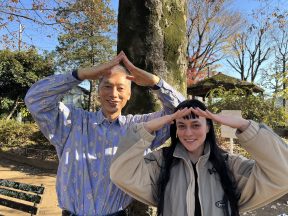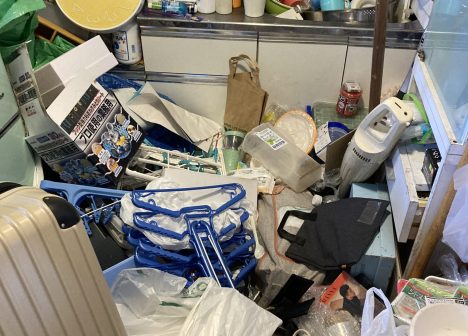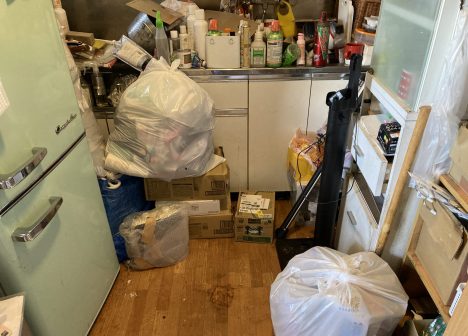Habitat's domestic housing support "Project HomeWorks" aims to improve living conditions for elderly people, those with disabilities, and others who find it difficult to maintain their living spaces. In March, responding to numerous requests, we were able to conduct nine cleaning and tidying sessions with the help of volunteers.
One of March's activities was at Mr. Manabe's (pseudonym) home. Mr. Manabe is in his 50s and has mental health and developmental disabilities. Staff first visited in August last year for an assessment after being consulted by a local support center. At this time, the room was filled with mountains of belongings, with only a small space beside them where Mr. Manabe laid his futon to sleep. Due to poor health, he remained lying down while speaking with staff during the visit.
 Three months later in November, after waiting for his health to improve, we conducted the first cleaning and tidying session. However, Mr. Manabe was reluctant to throw away any belongings. With the help of four volunteers, we managed to clear space in the kitchen area of his apartment, but the total volume of items remained largely unchanged. When we visited again a month later, the room had nearly returned to its original state.
Three months later in November, after waiting for his health to improve, we conducted the first cleaning and tidying session. However, Mr. Manabe was reluctant to throw away any belongings. With the help of four volunteers, we managed to clear space in the kitchen area of his apartment, but the total volume of items remained largely unchanged. When we visited again a month later, the room had nearly returned to its original state.
When consulting with his visiting nurse about Mr. Manabe's situation, we learned that due to his developmental disability, he has a particularly strong attachment to objects and has trouble letting them go. He also dislikes having his routine disrupted and is more concerned than most about how others perceive him. Working with his case worker and nurse, we decided to try repeatedly discussing with him about letting go of items one by one, taking into account his unique needs and characteristics.
In March, when we visited with two volunteers, Mr. Manabe and his case worker were already sorting through items. The case worker had arrived an hour early to help Mr. Manabe get into the right mindset for organizing. When our volunteers joined in, unlike previous sessions, Mr. Manabe began willingly letting go of items in response to the volunteers' suggestions. Surprised by this change, we asked if something had shifted in his mindset. He replied that his health had improved compared to before, and simultaneously, he felt like something had "clicked" mentally. While Mr. Manabe had barely interacted with volunteers in previous sessions, this time he opened up and actively communicated with them. At the end of the activity, he said, "I'll try to sort through the remaining items before the next visit," and we scheduled another visit for two months later.
We believe the significant change in Mr. Manabe's mindset was influenced by the persistent support and understanding from local case workers and nurses dedicated to understanding and helping him. Additionally, the presence of volunteers who worked alongside him proved to be a reassuring force. Habitat will continue working to contributing to the community in Tokyo by cooperating with local welfare organizations and with the help of volunteers.


